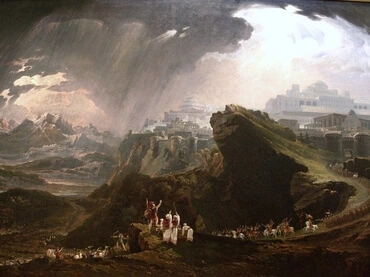1
This was the lot for the tribe of Manasseh, for he was the firstborn of Joseph. As for Machir the firstborn of Manasseh, the father of Gilead, because he was a man of war, therefore he had Gilead and Bashan.
2
So this was for the rest of the children of Manasseh according to their families: for the children of Abiezer, for the children of Helek, for the children of Asriel, for the children of Shechem, for the children of Hepher, and for the children of Shemida: these were the male children of Manasseh the son of Joseph according to their families.
3
But Zelophehad, the son of Hepher, the son of Gilead, the son of Machir, the son of Manasseh, had no sons, but daughters: and these are the names of his daughters: Mahlah, Noah, Hoglah, Milcah, and Tirzah.
4
They came near before Eleazar the priest, and before Joshua the son of Nun, and before the princes, saying, "Yahweh commanded Moses to give us an inheritance among our brothers." Therefore according to the commandment of Yahweh he gave them an inheritance among the brothers of their father.
5
Ten parts fell to Manasseh, besides the land of Gilead and Bashan, which is beyond the Jordan;
6
because the daughters of Manasseh had an inheritance among his sons. The land of Gilead belonged to the rest of the sons of Manasseh.
7
The border of Manasseh was from Asher to Michmethath, which is before Shechem. The border went along to the right hand, to the inhabitants of En Tappuah.
8
The land of Tappuah belonged to Manasseh; but Tappuah on the border of Manasseh belonged to the children of Ephraim.
9
The border went down to the brook of Kanah, southward of the brook. These cities belonged to Ephraim among the cities of Manasseh. The border of Manasseh was on the north side of the brook, and ended at the sea.
10
Southward it was Ephraim's, and northward it was Manasseh's, and the sea was his border. They reached to Asher on the north, and to Issachar on the east.
11
Manasseh had three heights in Issachar, in Asher Beth Shean and its towns, and Ibleam and its towns, and the inhabitants of Dor and its towns, and the inhabitants of Endor and its towns, and the inhabitants of Taanach and its towns, and the inhabitants of Megiddo and its towns.
12
Yet the children of Manasseh couldn't drive out the inhabitants of those cities; but the Canaanites would dwell in that land.
13
It happened, when the children of Israel had grown strong, that they put the Canaanites to forced labor, and didn't utterly drive them out.
14
The children of Joseph spoke to Joshua, saying, "Why have you given me just one lot and one part for an inheritance, since I am a great people, because Yahweh has blessed me so far?"
15
Joshua said to them, "If you are a great people, go up to the forest, and clear land for yourself there in the land of the Perizzites and of the Rephaim; since the hill country of Ephraim is too narrow for you."
16
The children of Joseph said, "The hill country is not enough for us. All the Canaanites who dwell in the land of the valley have chariots of iron, both those who are in Beth Shean and its towns, and those who are in the valley of Jezreel."
17
Joshua spoke to the house of Joseph, even to Ephraim and to Manasseh, saying, "You are a great people, and have great power. You shall not have one lot only;
18
but the hill country shall be yours. Although it is a forest, you shall cut it down, and it's farthest extent shall be yours; for you shall drive out the Canaanites, though they have chariots of iron, and though they are strong."







